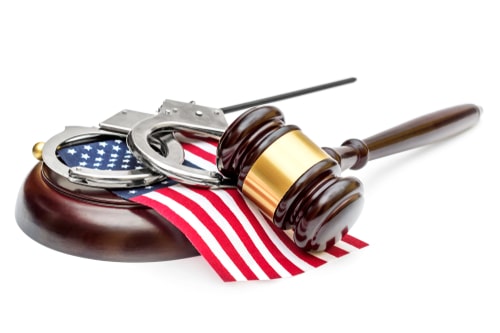TELEPHONES ANSWERED 24 HOURS A DAY
Recent Blog Posts
Can I Use Entrapment as a Defense Against Federal Charges?
 Federal law enforcement agencies spend significant amounts of time and resources on investigations. The Federal Bureau of Investigation (FBI), the Bureau of Alcohol, Tobacco, Firearms and Explosives (ATF), and the Drug Enforcement Agency (DEA) are known to sometimes conduct their investigations using undercover agents. The FBI, for example, is known for employing agents who pretend to be minors and arresting people who proposition them for sexual activity.
Federal law enforcement agencies spend significant amounts of time and resources on investigations. The Federal Bureau of Investigation (FBI), the Bureau of Alcohol, Tobacco, Firearms and Explosives (ATF), and the Drug Enforcement Agency (DEA) are known to sometimes conduct their investigations using undercover agents. The FBI, for example, is known for employing agents who pretend to be minors and arresting people who proposition them for sexual activity.
Such methods have sparked legal challenges, with some claiming they constitute entrapment by unfairly drawing innocent people into committing federal crimes. This article will discuss what entrapment is, when it can be used as a defense against federal criminal charges, and how to contact an Illinois criminal defense attorney who will protect your rights.
What Is Entrapment?
Entrapment is when a government agent induces an innocent person to commit a crime they would not otherwise have committed. This is more than just creating the temptation for the person to commit the offense; it involves pushing or encouraging him or her to carry out the crime. If a defendant can prove he or she was entrapped, it is a complete defense to criminal charges.
How Do Federal Conspiracy Charges Work?
 A federal conspiracy charge can be an extremely intimidating accusation. Unlike other offenses, which require prosecutors to present proof that you committed a crime, a federal conspiracy charge does not require a crime to actually have been committed. Instead, it is seen as a way for the government to "widen the net" when pursuing a conviction.
A federal conspiracy charge can be an extremely intimidating accusation. Unlike other offenses, which require prosecutors to present proof that you committed a crime, a federal conspiracy charge does not require a crime to actually have been committed. Instead, it is seen as a way for the government to "widen the net" when pursuing a conviction.
Understanding federal conspiracy charges is the first step toward building a strong defense. The best way to learn how federal conspiracy charges work is to consult an Illinois federal conspiracy defense attorney. This article will discuss what a federal conspiracy charge is and some legal strategies to defend against it.
What Is a Federal Conspiracy Charge?
Under 18 U.S. Code § 371, it is a federal offense to conspire to commit a crime against the United States or to defraud the United States. This means that two people or more can be charged with federal conspiracy if they plan to commit a federal crime. The fact that the law uses the word "conspire" means that the offense does not have to be committed — it only needs to be planned.
Can I Be Charged with Human Trafficking If There Is Consent?
 Human trafficking, sometimes referred to as trafficking in persons, is a federal crime in the United States and many countries around the world. It is usually understood to refer to coercing someone, through force or fraud, to do certain things they are unwilling to do. However, the laws on human trafficking are relatively complex. A person’s willingness to perform a task does not necessarily determine whether he or she is considered a human trafficking victim.
Human trafficking, sometimes referred to as trafficking in persons, is a federal crime in the United States and many countries around the world. It is usually understood to refer to coercing someone, through force or fraud, to do certain things they are unwilling to do. However, the laws on human trafficking are relatively complex. A person’s willingness to perform a task does not necessarily determine whether he or she is considered a human trafficking victim.
There are two main types of human trafficking:
-
Forced labor
-
Sex trafficking
This article will discuss both forms, as well as how consent factors into the crime. If you have been charged with human trafficking, reach out to an Illinois human trafficking defense attorney right away.
Forced Labor
Federal law defines forced labor as using fraud, coercion, or force to "exploit the labor or services" of someone else. Domestic servitude, for example, is a type of forced labor that involves a person performing work in a private residence, often in isolation. The person’s employer might use the threat of withholding housing or food to force the victim into working.
Can AI-Generated Content Be Considered Child Porn?
 Artificial intelligence (AI) is transforming not only the tech industry but the world as we know it. Its applications are nearly endless, with AI technology being used to generate news articles, films, academic papers, images, and more. It powers personal assistants, self-driving cars, and robots. It is used in the healthcare, agriculture, marketing, and manufacturing sectors.
Artificial intelligence (AI) is transforming not only the tech industry but the world as we know it. Its applications are nearly endless, with AI technology being used to generate news articles, films, academic papers, images, and more. It powers personal assistants, self-driving cars, and robots. It is used in the healthcare, agriculture, marketing, and manufacturing sectors.
However, as AI continues to become more pervasive, criminal defense law has evolved to adapt to its different uses. Child pornography, for example, can now be created by using AI to generate sexually explicit images of fictitious minors. AI can also be used to generate deepfakes where a real child’s face is superimposed on a sexually explicit image.
But can someone be prosecuted for having child pornography if it is a fake image produced by AI technology? This article will explore that question and discuss when AI-generated child pornography becomes a federal crime. If you or someone you know is facing child pornography charges, reach out to an Illinois criminal defense attorney right away.
When Is Chargeback Fraud a Federal Crime?
 Thirty-three percent of Gen Zers either know someone who has committed chargeback fraud or admit to doing it themselves, according to recent data. Forty-two percent say they would be willing to commit chargeback fraud, and 22 percent of Millennials admit to doing so.
Thirty-three percent of Gen Zers either know someone who has committed chargeback fraud or admit to doing it themselves, according to recent data. Forty-two percent say they would be willing to commit chargeback fraud, and 22 percent of Millennials admit to doing so.
Chargeback fraud is when a customer buys a product and then calls the credit card company to dispute the charge even though it is a legitimate purchase. If the credit card company reverses the charge, it is referred to as a chargeback. In such a case, the customer gets to keep the product without paying for it. On the other hand, the merchant loses the merchandise as well as the money from the sale. The business is also fined by the credit card company for the chargeback.
Chargeback fraud is a form of first-party fraud, which is when an individual misrepresents his or her identity or gives false information to defraud a business or organization. First-party fraud can be treated as a state or federal crime, which this article will explore. To know more about your specific case, speak with an Illinois first-party fraud attorney.
Can I Get Jail Time If I Download a Movie Illegally?
 If you want to download a movie, song, software, or any work made by someone else, you need to do one of two things: You either need to pay for the work, or obtain permission from the owner first. Otherwise, it is a federal internet crime called copyright infringement.
If you want to download a movie, song, software, or any work made by someone else, you need to do one of two things: You either need to pay for the work, or obtain permission from the owner first. Otherwise, it is a federal internet crime called copyright infringement.
As we will see, copyright infringement can be punished severely, even more than some violent crimes. If you have been accused of copyright infringement, contact an Illinois copyright infringement attorney to make sure your rights are protected.
Will I Get Jail Time If I Download a Movie Illegally?
Copyright infringement can either be classified as a civil offense or a criminal offense. If you download a movie at home and privately watch it for your own pleasure, it will likely be considered a civil offense. In that case, you are not likely to receive jail time, but the studio can sue you for damages.
Federal Crimes Involving Damage to Religious Property
 Being accused of a federal hate crime is a serious matter that requires immediate attention and expert legal guidance. If you find yourself in this situation, it is crucial to understand the charges, potential consequences, and steps you should take to protect your rights. An Illinois lawyer can help you potentially build a strong defense.
Being accused of a federal hate crime is a serious matter that requires immediate attention and expert legal guidance. If you find yourself in this situation, it is crucial to understand the charges, potential consequences, and steps you should take to protect your rights. An Illinois lawyer can help you potentially build a strong defense.
What to Know About Federal Hate Crime Charges
A federal hate crime involving damage to religious property is prosecuted under 18 U.S.C. § 247. This law prohibits intentionally damaging, defacing, or destroying religious real property or attempting to do so because of its religious character. The offense becomes more severe if it involves the use of fire, explosives, or other dangerous weapons. Key elements prosecutors must prove:
- The damaged property was used for religious purposes
What Happens If You Get Charged With Immigration Marriage Fraud?
 Immigration marriage fraud is a serious offense that can lead to severe consequences for both U.S. citizens and foreign nationals. Entering into a marriage solely to obtain immigration benefits can lead to criminal charges and severe penalties for the couple involved. An Illinois lawyer can help you determine what constitutes immigration marriage fraud, the legal consequences, and how to protect yourself if you are facing such charges.
Immigration marriage fraud is a serious offense that can lead to severe consequences for both U.S. citizens and foreign nationals. Entering into a marriage solely to obtain immigration benefits can lead to criminal charges and severe penalties for the couple involved. An Illinois lawyer can help you determine what constitutes immigration marriage fraud, the legal consequences, and how to protect yourself if you are facing such charges.
What Constitutes Immigration Marriage Fraud?
Immigration marriage fraud is when a U.S. citizen or permanent resident marries a foreign national solely to help gain legal status in the United States. This type of marriage is not based on a genuine relationship but rather on deception and the desire to circumvent immigration laws. Examples of immigration marriage fraud include:
- Entering into a marriage exclusively for the purpose of immigration advantages
Defending Against Federal Identity Theft Accusations
 If you face federal charges related to identity theft, the road ahead may seem like it is too much to bear. Identity theft is a serious crime that can carry potentially severe penalties under federal law. However, you do not have to face this difficult situation alone. An Illinois lawyer can provide the strong, strategic defense you need and protect your rights every step of the way.
If you face federal charges related to identity theft, the road ahead may seem like it is too much to bear. Identity theft is a serious crime that can carry potentially severe penalties under federal law. However, you do not have to face this difficult situation alone. An Illinois lawyer can provide the strong, strategic defense you need and protect your rights every step of the way.
What You Should First Know About Federal Identity Theft Charges
Identity theft happens when an individual uses someone else's personal information, like personal Security number or credit card details, without consent to engage in fraudulent activities or other criminal acts. While many identity theft cases are prosecuted at the state level, identity theft becomes a federal offense when it involves certain aggravating factors, such as:
- Stealing the identity of a deceased person
What is Considered Federal Credit Card Fraud?
 Committing credit card fraud is a significant crime that carries severe consequences. You could face hefty fines and extended imprisonment. An Illinois lawyer can help you understand what constitutes federal credit card fraud and the potential consequences for those convicted.
Committing credit card fraud is a significant crime that carries severe consequences. You could face hefty fines and extended imprisonment. An Illinois lawyer can help you understand what constitutes federal credit card fraud and the potential consequences for those convicted.
What Exactly is Federal Credit Card Fraud?
Federal credit card fraud occurs when an individual knowingly intending to defraud uses, attempts to use, or conspires to use a counterfeit, altered, forged, lost, stolen, or fraudulently obtained credit card. It also includes the unauthorized use of a credit card obtained through fraudulent means, such as identity theft. Credit card fraud is a federal charge when the fraudulent activity crosses state lines or international borders. For example, if you stole someone’s credit card in Illinois to make online purchases at a retailer in Florida, this turns into federal credit card fraud.




